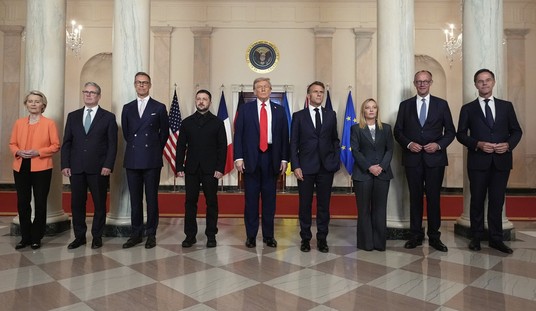“No one could have seen this coming,” CNN’s anchors remarked this morning after Colorado Sen. Michael Bennet announced his entry into the Democratic presidential race. Well, maybe only one person might not have seen it coming, but we’ll get to that in a minute. Bennet announced his entry on CBS This Morning, telling John Dickerson that he’s healthy and ready to serve:
"It was very clarifying." — @SenatorBennet on the influence his prostate cancer diagnosis had on his decision to run.https://t.co/X7ass6bczO pic.twitter.com/nvFUf4tlxT
— CBS This Morning (@CBSThisMorning) May 2, 2019
John Dickerson reminds Bennet that twenty Democrats have already jumped into the race. “You’re not even the only Democrat from Colorado,” the CBS anchor points out; John Hickenlooper jumped into the race weeks ago. What makes Bennet different? His “tendency to tell the truth,” a barb which Bennet intends for Donald Trump but which sounds more like a criticism of the Democratic field … and perhaps especially its now-official frontrunner:
Q: How do you distinguish yourself from all the other candidates?
"I have a tendency to tell the truth… I don’t think anybody has as broad of set of experiences in the field." — @SenatorBennet https://t.co/X7ass6bczO pic.twitter.com/yMk3pTrTYN
— CBS This Morning (@CBSThisMorning) May 2, 2019
Bennet might be aiming at Joe Biden in more ways than one, Politico suggests:
Bennet will try to carve out space in the moderate lane of the Democratic presidential primary, which has grown more crowded since former Vice President Joe Biden joined the race last week. Bennet has built a reputation as a bipartisan, policy-focused senator on Capitol Hill, trending toward the center of the Democratic spectrum. He opposes a single-payer health care system, instead hoping to expand on Obamacare.
Bennet also dinged his own party in the interview, saying that “right now, the Democratic Party doesn’t stand for very much at the national level,” but that the sprawling 2020 primary will give candidates “the opportunity for us to show what we stand for, for us to have a competition of ideas,” Bennet said. “A process like this is long overdue in the Democratic Party.”
The senator also identified “two enormous challenges” on CBS, highlighting a “lack of economic mobility and opportunity for most Americans” and a “need to restore integrity to our government,” likely thematic elements for his presidential bid.
Bennet has less chance than most of the other 20-odd oddities in the Democratic race. He’s a white male in a party obsessed with identity politics, and he’s a moderate in a party being driven off a cliff by hard-progressive activists. In fact, Bennet and Hickenlooper might be indistinguishable now that they’re both in the race together.
The import of Bennet’s announcement is that Biden hasn’t closed the door to the primary race. Bennet may not make much of a dent, but he’s still a US Senator and still someone with significant clout. One would expect that the entry by a months-long frontrunner and clear party leader would not just close the drawbridge behind him, but convince a few others to jump back across the moat as it closed. As I argue in my column for The Week, Biden’s entry might even incentivize more people to jump in — perhaps with higher profiles:
What will happen if potential candidates with higher national profiles jump into the race? Former New York City mayor and multi-billionaire Michael Bloomberg has acknowledged that he’s been thinking about jumping into the race. Attempts have been made to draft celebrity candidates such as Oprah Winfrey or Mark Cuban to combat Trump’s celebrity and populist standing.
All three have the time, and more importantly the money, to start off with instant credibility and organization. All three have been public in their opposition to Trump, and all three have identity claims that reflect Democratic contemporary sensibilities better than Biden does. Nothing about Biden’s track record as a candidate or as a fundraiser would necessarily discourage those entries. In fact, his well-known shortcomings on both counts might prompt significant concerns about allowing the nomination to default once again to a two-time also-ran.
That brings us to Biden’s biggest vulnerability in the primaries, and perhaps the biggest reason to keep that drawbridge down. Biden is a candidate who was best suited to run for the nomination not in 2020 but in 2016, when he could have run as someone to safeguard Obama’s legacy. He has been out of office for four years, after working in Washington continuously for over 40 years. His candidacy will have to rely on looking back in time when most Democratic voters want to look forward. Biden is an establishmentarian in a populist wave fueled even more by resentment over the right-leaning populism behind Donald Trump’s ascendancy. He is, to put it bluntly, an old white male politician in a party that puts identity politics at the core of its message — a defect that Abrams saw clearly enough when Team Biden was sending up its trial balloons last month.
The longer Biden stays a front-runner before the debates, the more it incentivizes a challenge from one or more big-name candidates who speak more clearly to the Democrats’ brand of today. Democrats got caught napping four years ago in defaulting to an old name in party politics. Their patience this time around might be much shorter — and their desire for fresh faces may not yet be sated.
Biden may be riding high in the polls now, but don’t expect it to last. His fellow Democrats clearly don’t.








Join the conversation as a VIP Member